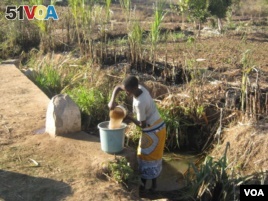May 25,2013
CHIKHWAWA DISTRICT, MALAWI — A few years ago, residents of Malawi's southern district of Chikhwawa were often stricken with diarrhea often caused by cholera, an illness spread by unclean drinking water from unprotected sources like wells and rivers. Today, the situation is under control, thanks to an international NGO that’s drilling boreholes in the area for fresh drinking water and building latrines for family use.

In Malawi, woman in the central district of Dedza gathers water (VOA/L. Masina)
The Water and Sanitation Project was prompted by a study showing that Chikhwawa - with nearly half a million people -- has relatively few public toilets or other facilities supporting public hygiene.
Kate Harawa, the country director of Water for the People, the non-governmental organization sponsoring the effort, says " We looked at the statistics and found out that Chikhwawa was one of the least safety [districts] in terms of water supply and sanitation. At that time [2008] it was around 45 percent access to safe water and sanitation was very, very low. And ... there are a high percent of people who openly defecate.”
Harawa says to avert the situation, the organization is drilling boreholes starting with Makhuwira, Kasisi and Chapanganga --- areas under traditional authority where there's a high risk of contracting waterborne diseases.
“We have [built] more than 200 water points," she says, "and this year we are doing [additional] 41 and next year we [will build] 100.”
The project is also helping to build latrines in individual homes.
Health experts say the initiative has helped reduce incidences of diarrhea among the 8,000 households in the district.
They say before the introduction of the project in 2008, 0.2 percent of the district's population were infected, which is very high by world standards. Today, it's been reduced to 0.007 percent.
Beatrice Munyowa, one of health Instructors in the district, explains how that level was reached.
“To maintain the hygiene standards," she says, "we provide chlorine to the communities for treating the water and we also advise them to always cover the water and always keep clean the borehole surroundings.”
Besides advice from health experts, villagers themselves have formed committees responsible for the sanitation and the maintenance of the boreholes.
Emily Batumeyo, the secretary of the water point committee at Kasokeza village, says apart from the reduced incidents of water borne diseases, the project has made it easier to access clean water.
“Before the initiative," she says, "we used to travel long distances to fetch clean water. For example we would wake up early in the morning to battle for clean water at a water point which was as far as three kilometers away. Sometimes we would spend a night [there].”
The organization is implementing the project with support from international NGOs Global Sanitation Fund, Charity Water and Climate Justice Fund. Harawa says funds permitting; the NGO is planning to extend the initiative to the rest of the district to reach its goal of ensuring that everyone has access to safe water by 2018.
Water for the People has similar projects in other parts of Malawi -- in the peri-urban areas of Blantyre, and in the northern district of Rumphi - and in Rwanda and Uganda.